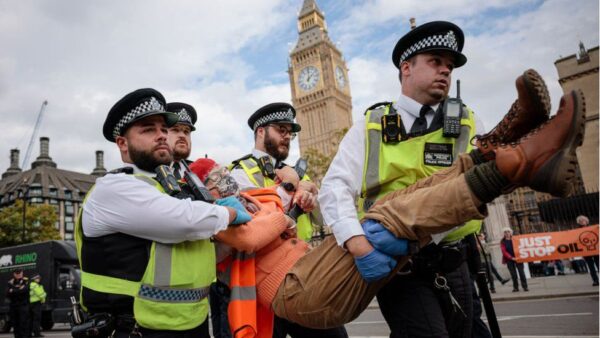Police may be allowed to close down protests earlier than they purpose severe disruption, below new authorities plans.
Downing Street stated the proposals could assist officials clamp down on “a disruptive minority” who use techniques like blockading roads and gradual marching.
It stated the adjustments are seeking for to present police extra flexibility and readability over while they could interfere.
But human rights institution Liberty stated the proposals amounted to an assault at the proper to protest.
The plans might be set out in an modification to the Public Order Bill, because of be brought on Monday.
Its goal is to crack down on disruptive protests via way of means of organizations like environmental activists Just Stop Oil, Insulate Britain and Extinction Rebellion, that have used techniques along with blockading roads.
The invoice, which covers England and Wales, is presently being scrutinised via way of means of the House of Lords and any adjustments at this degree may be blocked via way of means of friends earlier than they come to be law.
The proposals are in all likelihood to initiate sturdy competition from a few friends, who’ve been vital of preceding tries to boom police powers to close down protests.
No 10 stated the adjustments could imply police could now no longer must look forward to disruption to take area to close down a protest.
It stated forces can also do not forget the “general impact” of a chain of protests via way of means of the identical institution, in place of seeing them as standalone incidents.
Prime Minister Rishi Sunak stated: “The proper to protest is a essential precept of our democracy, however this isn’t always absolute. A stability should be struck among the rights of people and the rights of the hard-running majority to move approximately their every day business.
“We can not have protests carried out via way of means of a small minority disrupting the lives of the everyday public.”
Chief Constable BJ Harrington, the National Police Chiefs’ Council lead for public order and public safety, stated: “This will aid officials in hopefully and quick taking motion and making arrests wherein appropriate.”
All we recognise approximately the proposals to forestall what the authorities calls “disruptive protests” is a press launch issued via way of means of Downing Street.
Number 10 says an modification to the Public Order Bill will supply police “extra flexibility and readability” of their capacity to forestall demonstrators using “guerrilla techniques” and inflicting “chaos”.
But, as matters stand, we’ve little withinside the manner of readability due to the fact the entirety hinges on a definition of “severe disruption” and we do now no longer but have one.
Opposition events and civil liberty campaigners argue the police have already got powers to address risky or exceedingly disruptive protest. The Public Order Bill could introduce severe disruption orders, permitting police to area regulations on people and extra forestall and seek powers.
However, senior cops argue there’s a want for extra readability given the complexity of case law. The Metropolitan Police Commissioner, Sir Mark Rowley, says he desires to recognise “wherein the stability of rights ought to be struck”. The policing of the vigil for Sarah Everard stimulated criminal motion which noticed the High Court rule in March ultimate yr that the coping with breached the rights of the organisers.
But Martha Spurrier, director of human rights institution Liberty, stated the proposals have been “a determined try and close down any course for everyday human beings to make their voices heard”.
She stated permitting the police to close down protests earlier than any disruption had taken area “units a risky precedent”.
Labour chief Sir Keir Starmer stated the techniques of Just Stop Oil activists have been incorrect and “deeply arrogant” however police already had the energy to do so in opposition to them.
He instructed LBC officials may be given extra readability over while to interfere with out the want for legislation.
Labour peer Baroness Shami Chakrabarti, a former director of Liberty, stated police already had ok powers to arrest human beings obstructing highways and the authorities’s proposals gave officials “a clean cheque”.
“This, I fear, is ready treating all non violent dissent as efficaciously terrorism,” she instructed BBC Radio 4’s Today programme.
“This diploma of pre-emption will essentially close down the type of dissent that is not even inflicting disruption in any respect due to the fact their definition will set this kind of low bar.”
The Just Stop Oil institution defined the concept as “a sinister and authoritarian try and undermine the primary human rights that underpin our democracy”.
The Public Order Bill already covered provisions to create a brand new crook offence for interfering with key country wide infrastructure like oil refineries and railways and for “locking on”.
That tactic – wherein a person locks themselves to an item or building – has been utilized by a few weather protesters.
The invoice builds at the debatable Police, Crime, Sentencing and Courts Act, which exceeded ultimate yr and turned into criticised via way of means of a few organizations for introducing curbs at the proper to protest.
Under this present legislation, if the police need to limition a protest, they normally have to reveal it could end result in “severe public disorder, severe harm to assets or severe disruption to the lifestyles of the community”.
